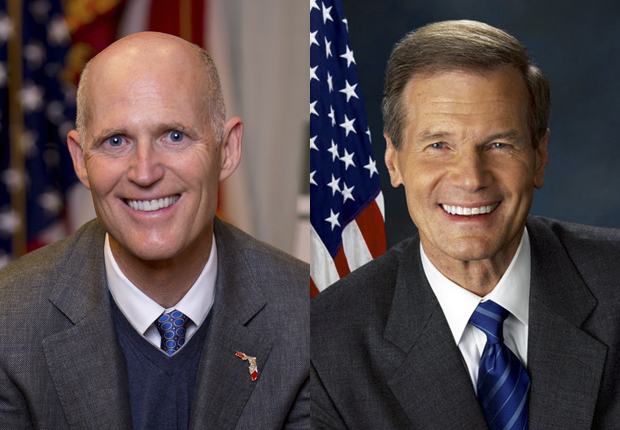AARP Hearing Center

By Tom Scherberger
Voters 50 and older will have a significant say in deciding the winner of the U.S. Senate battle between two political heavyweights: three-term Sen. Bill Nelson (D), 76, and Gov. Rick Scott (R), 65, who is finishing his second term.
An AARP poll conducted earlier this year in partnership with Politico asked Florida’s 50-plus voters to rank the importance of nine key issues. Large majorities cited Social Security (82 percent) and health care (78 percent) as their top priorities.
“The issues are big,” said Jeff Johnson, AARP Florida state director. “This election there has been a renewed focus on younger, first-time voters, but older voters dominate the landscape and tend to be the ones who always turn out.”
Social Security is financially sound now, but without changes, benefits will be cut by about 25 percent in 2034, according to the program’s board of trustees.
Both Nelson and Scott vow to protect Social Security and Medicare, but neither offered many specifics. They answered questions by email.
Nelson said he has fought “efforts by congressional Republicans and President Trump to turn Medicare into a voucher program and raise the eligibility age.”
He said he recently led efforts to close the Medicare Part D “doughnut hole”—a coverage gap that has led to higher out-of-pocket prescription drug costs—in 2019 instead of 2020. He said that will “save both seniors and taxpayers money.”
Scott said he would work to protect Medicare. While offering few details, he cited his efforts as governor, “increasing transparency to combat hospital price gouging.”
Sharp Split on Medicaid
Scott, who successfully fought efforts to increase Medicaid coverage in Florida under the Affordable Care Act, said state changes to the program improved access and quality and controlled costs.
Nelson supports Medicaid expansion, saying it would provide coverage to 800,000 Floridians, largely using federal funds:
“These folks just end up going to the emergency room at a cost to Florida’s taxpayers,” he said.
Nelson also supports tax credits for family caregivers and cosponsored the RAISE Family Caregivers bill, signed into law earlier this year, which establishes a coordinated strategy to support caregivers.
Scott did not address assistance for family caregivers. He stressed his role in cutting state taxes: “I have always believed that Americans can spend their own money far greater than government can.”
Scott supports allowing health insurance to be sold across state lines, which he said would encourage competition. And while he opposes the Affordable Care Act generally, he said he supports provisions that protect people with preexisting conditions and allow children to stay on their parents’ plans until they turn 26.
Voters on Nov. 6 will also choose a governor and the state’s 27 U.S. House members. All 120 state House seats are on the ballot, along with 20 of 40 state Senate seats.
AARP is nonpartisan and does not endorse candidates. For more on issues and candidates, go to aarp.org/vote4FL.
For more information, go to dos.myflorida.com/elections.
Tom Scherberger is a writer living in Tampa.































































